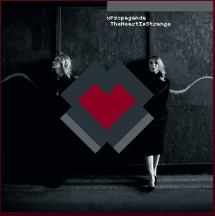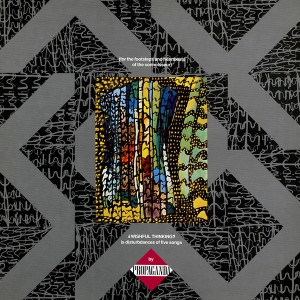 Though not a big hit on its original release, Propaganda’s 1985 album A Secret Wish only seems to grow in stature as the years pass.
Though not a big hit on its original release, Propaganda’s 1985 album A Secret Wish only seems to grow in stature as the years pass.
It was arguably the last meaningful release on the ZTT label, spawning two UK top 40 singles. More importantly it was a sonic treat, full of grandeur and drama, one of the great pop albums of the 1980s.
The Dusseldorf-formed band made a couple of botched attempts to reunite – the 1234 album in 1990, a Martin Gore/Tim Simenon-assisted try in 1998, then a partial gathering at Trevor Horn’s charity gig at Wembley Arena in 2004.
But now they’re back as xPropaganda (who knows the legal machinations behind that moniker). Founding members Michael Mertens and Ralf Dorper are not around this time but vocalists/songwriters Claudia Brucken and Susanne Freytag are, alongside Secret Wish producer/guitarist Steve Lipson.
Excitingly their album The Heart Is Strange is also on the newly reignited ZTT (Horn is credited as ‘Advisor’), via Universal Music Catalogue.
My expectations were high but then were slightly dashed with the choice of ‘Don’t You Mess With Me’ as lead-off single/trailer. It’s easily the least interesting track on the album.
Lush, cinematic opener ‘The Night’ definitely evokes memory of A Secret Wish’s epic track one ‘Dream Within A Dream’, even if Terry Edwards’ muted trumpet is incongruously ‘jazzy’ as opposed to the resplendent playing (by whom? Guy Barker? Steve Sidwell?) on the 1985 track. And there are too many vocal melodies to choose from, none particularly intriguing.
Elsewhere there are better tunes and the odd appealing lyrical zinger. And if synths are your bag, these sounds – mostly courtesy of Pete Murray – are fantastic, sometimes lush and ominous, sometimes intricate and ingenious. It’s great headphone music.
But there’s not enough memorable Lipson lead guitar on The Heart Is Strange and the drum programming is a bit flat. Paging Steve Jansen. Best track? The enigmatic closer ‘Ribbons Of Steel’, a nearly ten-minute spoken-word rumination on the end of a relationship with hints of the Pet Shop Boys and Prefab’s I Trawl The Megahertz.
The Heart Is Strange is a solid B+. Good in places but must try harder. Too many mid-tempo songs. Certainly not in the league of the freaky A Secret Wish (a lack of Mertens may have a lot to do with that?) and without that album’s pristine mastering, depth of sound, harmonic intrigue and wacky guest appearances, but some decent new material to play live. Maybe next time they’ll let their hair down a bit – and hopefully get Mertens involved again.
Brucken and Freytag speak about The Heart Is Strange in this podcast.
And Stephen Lipson deconstructs A Secret Wish and xPropaganda here.



